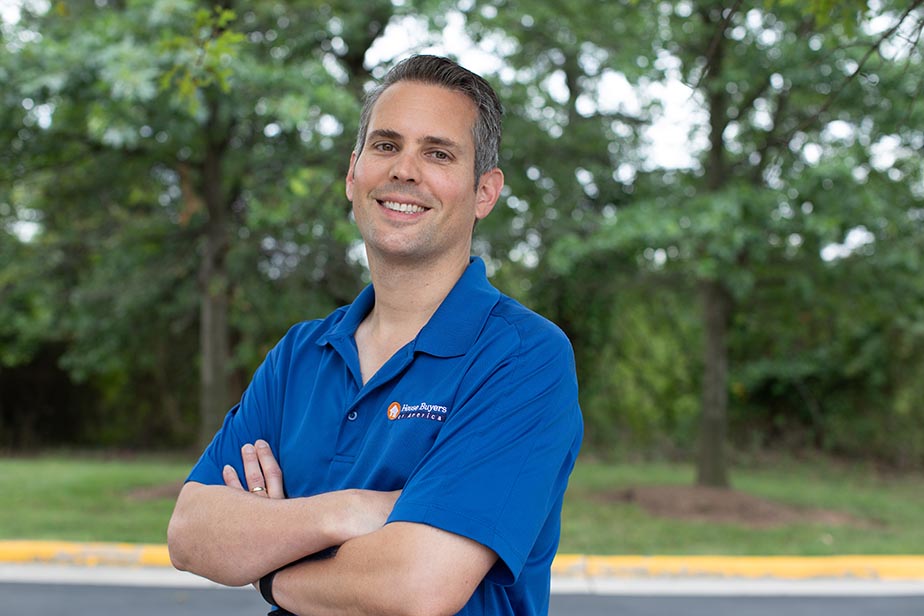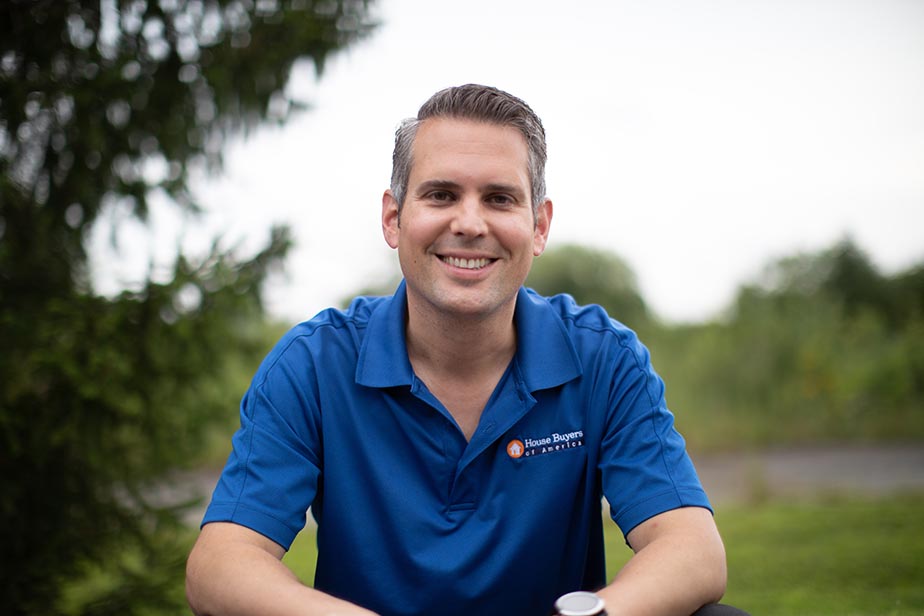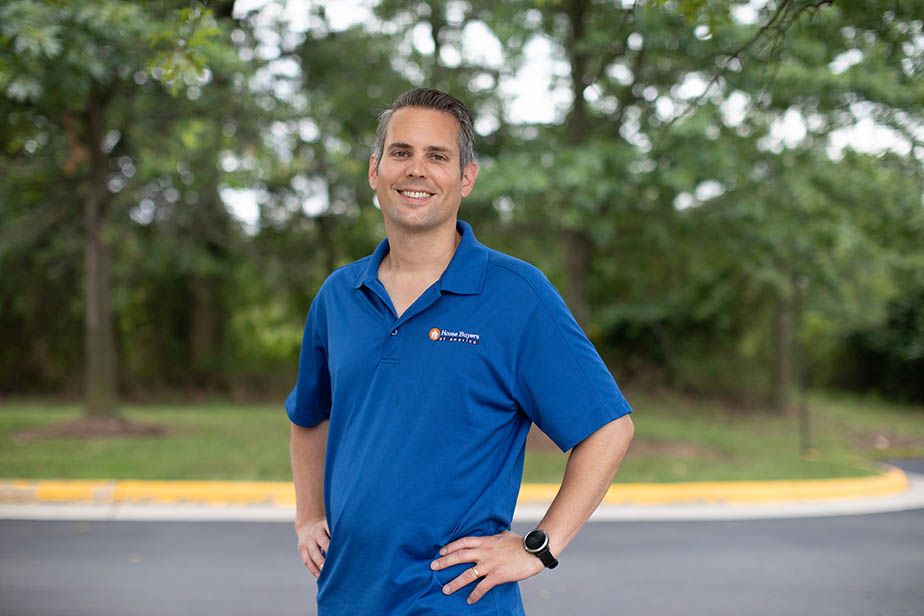
After studying Business, Economics, and Information Systems, Nick Ron began a successful career at CACI Marketing Systems, where he sold software and marketing systems. Out of a team of 12 salespeople, Nick brought in over half of all new business after only three years of being with CACI. His success at CACI gave him the confidence to launch into his next venture. Nick founded House Buyers of America in 2001 and has been running the company as CEO since it began. House Buyers has succeeded beyond Nick’s wildest imagination by leveraging tech, marketing systems, and operational excellence. House Buyers of America buys, renovates, and resells a high volume of homes, offering homeowners a way to sell their houses quickly and hassle-free. House Buyers has always been a high-growth company, going from $0 to $50 million in annual revenue in its first three years of business, and it is currently experiencing double-digit growth. Nick won the Ernst and Young Entrepreneur of the Year award and continues to reinvent the residential real estate industry with the latest technology and innovation.
Global Millionaire magazine recently caught up with Nick to discuss his journey as an entrepreneur and here’s what went down:
When did your entrepreneurial flair first reveal itself?
From a very young age, I learned the importance of being my own boss. I was one of four children, and my family was extremely poor – financially speaking. If I wanted to go to the movies or game-room, that extracurricular cost was my responsibility. At age nine, I started collecting five-cent cans. I did whatever it took to get those cans, even dumpster hopped! My business brought in $10-$20 each trip, and it was tax-free! At age 11, I started delivering newspapers before school at 5 am. Then I moved onto a landscaping business, and by college, I was waiting tables.
How did your life look like before being an entrepreneur?
Before I was an entrepreneur, as an adult, I worked for CACI, selling software. In my third year at the company, I brought in half of the new business on a 12-person team. I did not anticipate starting my own business until I read Rich Dad, Poor Dad, by Robert T. Kiyosaki. This piqued my interest in real estate. My success at CACI built up my confidence in my ability to lead and run an organization. My degree in economics and technology from George Washington University gave me a good baseline for using tech in business. In 2000, I began studying real estate and immediately dove in. When you grow up on welfare living in section 8 housing, you quickly learn that your hustle determines your survival.
As an entrepreneur, what is it that motivates and drives you?
My wife and four children motivate me through and through. Failure is not an option; I could never let them down. If I need to work 80-hour weeks, then so be it. Additionally, I will never give up on my church and Compassion International’s philanthropy work, where we sponsor children internationally.
In one word, describe your life as an entrepreneur and explain why.
Innovation – My entrepreneurial journey began with technology and the desire to reinvent an outdated market. Every day I think about how I can innovate traditional real estate tasks and industries beyond this market. Innovation brings the future into reality.
What were your top three motivations for starting your business?
Initially, my motivation was simply to buy rental properties for long-term wealth creation. Then as I navigated the industry, I realized two things. One, I was really good at doing real estate deals. Two, there was a huge need in the marketplace to offer a better alternative for homeowners to sell their homes. When I founded House Buyers, we wanted to be the Amazon of real estate. This meant fundamentally changing how real estate was traditionally conducted by offering an innovative alternative and leveraging technology. Our purpose was to make the process quick and easy for buyers and sellers. We always remained energized and focused on our vision by continuously upgrading our technology and studying the market to better serve our customers. Now, 20 years later, we are more focused than ever on making buying and selling homes easier and faster than ever for consumers by using the latest technology.
What would you say are the key elements for starting and running a successful business?
These are my top three key elements:
- I learned early on that you cannot be a jack of all trades and excel at everything. To be the best, you must hire outstanding people that specialize in the areas you do not. I have seen many real estate investors and business owners who become overloaded with trying to do it all. They never excel in the core functions of their business because they are spread too thin. Recognize your weaknesses and hire smart based on those inadequacies.
- Building your network of advisors is another key element. Your trusted advisors will become those you turn to for advice in areas of the inexperienced trade. They will save you from pitfalls and pull you through inevitable tough times. Gain wisdom from those who have been down the same road and do not try to reinvent the wheel.
- Always maintain healthy margins. Every day watch your costs and keep tweaking your process to maximize efficiency. If you operate on tight margins in a healthy market, you will never survive a downturn. Therefore, operate with extreme efficiency and always maintain healthy margins!

What are two of the biggest challenges you have faced growing the business, and how did you overcome them?
When I first started House Buyers of America, our first challenge was the lack of experience, which often caused mistakes. While the errors were painful and sometimes costly, we took them as growth opportunities. We would closely analyze the specific experience and develop a preventative system. You never want to make the same mistake twice. The second action we took to overcome inexperience included hiring industry experts in the areas that we lacked knowledge of.
The second challenge we underwent was the 2008 Great Recession. That time-period could not have been worse for real estate. Challenges included everything from housing inventory to financial constraints across the board. We literally went through two years of hell and do not ever want to go through that again. We learned all we could from this experience. We operated on sound principles that helped us get through future downturns with flying colors.
One of the biggest lessons learned through this period of time was to be conservative. Always apply Murphy’s Law when it comes to finances. There was no crystal ball to predict a market crash, and there is not one that will indicate the next one. You must keep your debts low and have healthy cash reserves to be well-positioned before the downturn to weather the storm. Always be cautious and conservative. Do not get into debt or try to invest significant amounts of money in unproven ventures. The second lesson learned was to always strive for excellence and continuously improve your business. If you do not improve your technology, your systems will become outdated, and you will lose customers and employees. They will see that your company is not evolving into the future.
What form of marketing has worked well for your business throughout the years?
We have always run a combination of marketing campaigns throughout the years, including TV, digital – social and Google Ads, direct mail, and even billboards. We realized that we could make many advertising mediums successful over the years, but we needed to test different ads and track, track, and track constantly. We diligently track the results of each campaign and constantly tweak them. We also regularly adjust how much to invest in each marketing medium. Each medium has a different point of diminishing returns, so you don’t want to overinvest. You must find out what that point is in each medium for your business. We analyze each campaign and determine how customers are responding. Each market has different consumers; therefore, the performance of each campaign will vary greatly. Success is seen when you analyze your ROI data and conduct multiple campaigns throughout the year. Do not put all your eggs in one basket because all consumers do not live and shop on one platform. Reaching consumers will vary based on market conditions, and your marketing techniques must evolve with consumer habits.
As you grew the business, what have been some of the most important leadership lessons you have learned?
- Remain Humble and Always Ask for Advice
Pride comes before the fall. Know your limitations and realize you have blind spots that can only be corrected by getting advice from others around you and outside counsel.
- Conduct Low-Cost Tests
The first few years in business, I over-invested in unproven ideas. This resulted in wasted money that could have been avoided had I done low-cost tests. Entrepreneurs are creatively optimistic at heart. Before you invest in a new idea, conduct small tests until the concept is tried and proven. I continue to be an idea maker today, as entrepreneurs always should be, but I have the experience now to learn from my earlier mistakes.
- Persistence & Adaptability Pay Off
When the market crashed in 2008, some peers went back into IT sales or switched to commercial real estate. They had to start over in a new career and go after a completely different customer base. The grass often appears to be greener on the other side. These people had the mindset that when the tough get going, it is time to quit! This never made sense to me. Long-term, real estate is a promising industry if you adapt. I knew it would eventually recover. If you jump to an industry because it is hot right now, realize that ultimately, that industry will have a down cycle as well. Do not give up, instead be persistent and adapt your systems to consumer needs. Always be willing to try new things. Run multiple tests every quarter to see what works and what does not work.

What is the best advice you have ever been given?
I once learned from another real estate investor that you want to get your business model down to a science, so it almost becomes boring. Then at this point, you can expand. What keeps me excited about this business is that we can quickly scale our real estate business and launch into other markets because we have our system down to a science. We could get bigger by purchasing bigger properties like office buildings or buying other commercial real estate. But I’d have to learn a whole new game, and I wouldn’t be the best at it. So, I decided I could grow quicker by just buying a larger volume of houses in multiple markets rather than investing in different property sectors in one market.
What advice would you give to a newbie Entrepreneur setting up their first business?
Get your network of advisors in place! In January of 2001, when I started my company, I lined up my title company, attorneys, real estate brokers, contractors, and home inspectors. You do not need to know everything when you get started. However, you do need your network in place to help you through the process. Take the time to find the best people and learn from them as you go along!